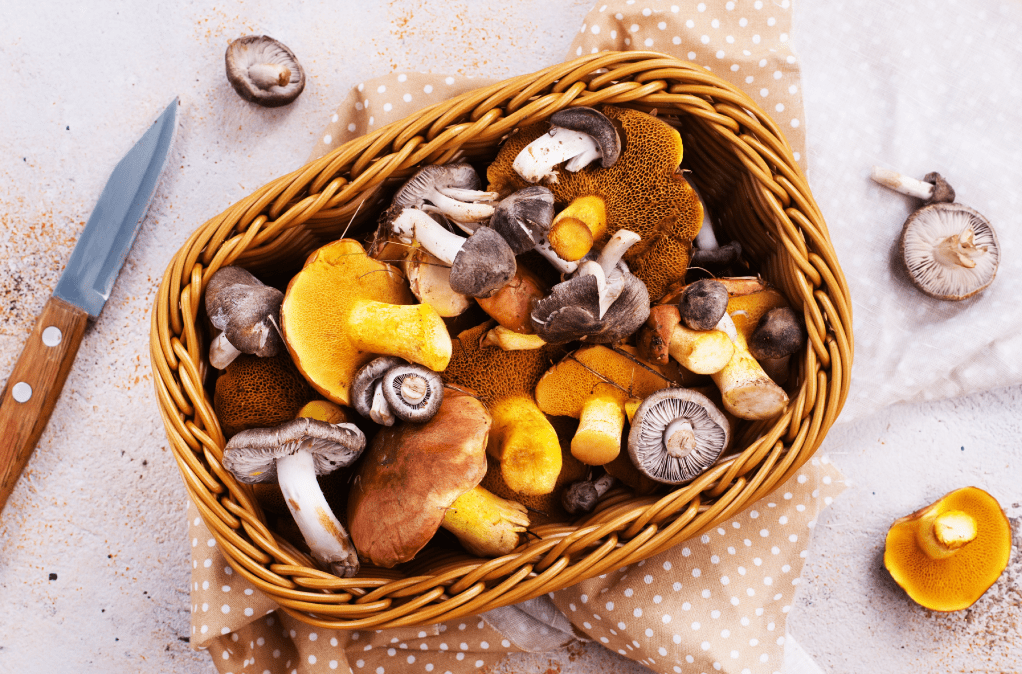Key Ingredients In Mushroom Supplements: Active Agents For Your Health:
Medicinal mushrooms have been rapidly growing in popularity, with the global functional mushroom market expected to reach $19.3 billion by 2030. More and more consumers are reaching for mushrooms to address a wide range of health concerns, from low energy to cancer. Mushrooms offer a vast wealth of health-promoting substances, some with profound effects. Keep reading to discover many key ingredients in mushroom supplements that promote well-being and vitality.
Medicinal mushrooms: a brief background
Mushrooms have been appreciated for their healing potential across the world for thousands of years. Medicinal mushrooms have been a part of Traditional Chinese Medicine for centuries, and the Chinese have long referred to Reishi mushroom (‘ling zhi’) as ‘the spirit plant’ in recognition of its effects on longevity. Indigenous peoples of North America used puffball mushrooms (Calvatia genus) to heal wounds.
Mushrooms as medicine have appeared in Egyptian hieroglyphics and ancient Greek and Roman texts. While Hippocrates recognized the anti-inflammatory properties of mushrooms in 450 BCE, modern medical science has only begun investigating the profound health benefits of medicinal mushrooms over the past few decades.

Key ingredients in mushroom supplements that boost cognitive function
Neurodegenerative diseases develop when neurons in the brain and spinal cord begin to break down. Oxidative stress plays a significant role in this disease process as the buildup of free radicals leads to lipid, protein, and organelle damage, eventually culminating in neuronal death. Studies have shown that Lion’s Mane (Hericium erinaceus), a medicinal mushroom long appreciated by Traditional Chinese Medicine, may prevent certain memory impairments associated with Alzheimer’s disease and even alleviate mild cognitive impairment.
Polysaccharides are a key ingredient in Lion’s Mane that help it to achieve this effect. These long-chain carbohydrates found mainly in cell walls counteract oxidative stress and improve mitochondrial function. The best-known key ingredients in mushroom supplements that promote health are polysaccharides called beta-glucans, and quality supplement makers will list beta-glucan content on the label.
Lion’s Mane is steadily gaining an appreciation for its positive effects on brain and nerve health, and it contains two important low-molecular weight compounds that easily cross the blood-brain barrier to confer their benefits to cognitive function. Hericenones and erinacines in Lion’s Mane have been proven to promote the synthesis of nerve growth factor (NGF), a protein that is essential for the survival and differentiation of sympathetic and sensory neurons.
NGF plays a critical role in the repair and regeneration of neurons, and hericenones and erinacines are two key ingredients that allow Lion’s Mane to induce brain tissue regeneration. The positive effects of this potent medicinal mushroom on cognitive function continue to be investigated.

Key ingredients in mushroom supplements that fight fatigue
Fatigue may result from overwork, lack of sleep, certain medicines, anxiety, depression, or other illness, and it affects about 20% of people worldwide. While stimulants such as caffeine or energy drinks may provide temporary relief, they are ineffective long-term and may even damage health. Cordyceps (Cordyceps sinensis), a parasitic fungus long used traditionally for its capacity to boost energy, contains polysaccharides that scavenge free radicals, reducing oxidative stress that would otherwise impair cellular functions and cause fatigue.
These key ingredients also counteract the accumulation of lactic acid and the depletion of glycogen stores that induce fatigue during exercise. CSP1 is a known polysaccharide in Cordyceps that increases blood insulin and the activity of certain enzymes that boost the glucose metabolic rate in cells.
Key ingredients in mushroom supplements may also fight fatigue by increasing the efficiency of the cardiovascular system. For example, Reishi mushroom (Ganoderma lucidum) contains adenosine, which is known to have a vasodilation effect, increasing blood flow and the supply of oxygen and nutrients to organs and muscles. Adenosine is one of the nucleotides in DNA as well as a molecular component of ATP. Also found in Cordyceps, this key ingredient inhibits platelet aggregation, which improves circulation for an overall positive effect on energy levels.

Key ingredients in mushroom supplements that fight aging
A study published in 2021 that followed the diets of 15,000 Americans for almost 20 years concluded that those who consumed mushrooms had a 16% lower overall mortality risk. L-ergothioneine is a key ingredient in mushroom supplements that may boost longevity through its capacity to protect DNA and slow the shortening of telomeres.
This potent amino acid concentrates in cell mitochondria, where it neutralizes free radicals before they damage cell structures. L-ergothioneine is not produced in the human body and must be consumed as part of a healthy diet or in supplements. It is found in the highest concentrations in King oyster, maitake, and shiitake mushrooms. Correlations have been found between higher blood levels of this amino acid and longer life expectancy, but also lower incidence of cardiovascular disease, cognitive impairment, inflammatory bowel disease, frailty, and Parkinson’s disease.
Key ingredients in mushroom supplements may also protect against the harmful rays of the sun. UV energy is known to induce the production of free radicals, leading to cell damage and collagen degradation. Decreases in extra-cellular matrix components like collagen often result in the manifestation of wrinkles and other signs of skin aging.
Polysaccharides in Reishi (Ganoderma lucidum) protect against UVB-induced photoaging by combating free radicals. Peptides are molecules containing two or more amino acids, and some varieties also reduce oxidative stress. Ganoderma lucidum peptide (GLP) is the most potent antioxidant component of Reishi, and its low molecular weight allows it to be easily absorbed by the small intestine. Mannitol is a sugar alcohol found in Cordyceps that also acts as a free radical scavenger. These are just a few of the key ingredients in mushroom supplements that fight aging.

Key ingredients in mushroom supplements that boost immune function
Many diseases of aging, such as pneumonia, dementia, and cancer, are associated with declines in immune function. An aging immune system causes chronic inflammation and is less able to protect against pathogens and malignancies.
Beta-glucans are the best-known immune-boosting components of medicinal mushrooms, and because digestive enzymes do not degrade them, they may travel intact to the small intestine where they activate specific receptor sites. These potent molecules boost immunity by increasing the number and function of macrophages, natural killer cells, and T cells. (Health11news Report)
A variety of key ingredients in mushroom supplements help to regulate immune function. Shiitake mushroom (Lentinus edodes) contains lentinan, an immune-stimulating beta-glucan with antiviral and antibacterial properties.
Cordyceps improves immunity by stimulating natural killer cells and increasing the production of important immune signaling molecules called cytokines. Polysaccharides and adenosine are key ingredients in Cordyceps thought to produce its immune-regulating effect. Beta-D-glucan in Reishi mushroom has a potent effect on macrophages, helping them to kill pathogens more effectively.

Key ingredients in mushroom supplements that help fight cancer
Cancer is the second leading cause of death in industrialized nations, and conventional cancer treatments carry significant side effects, including immunosuppression, skin irritations, and fatigue. The most commonly studied medicinal mushrooms in the realm of cancer treatment are Reishi (Ganoderma lucidum) and Turkey Tail (Trametes versicolor). Polysaccharide krestin (PSK) and polysaccharide peptide (PSP) found in Turkey Tail, and beta-glucans and triterpines in Reishi have all been shown to damage or kill tumor cells.
Triterpines are a type of biologically active polysaccharide similar in structure to steroid hormones. PSK, known commercially as ‘Krestin,’ is an approved anticancer drug in Asia and has been shown to reduce cancer recurrence when used along with chemotherapy.
A 2021 review concluded that higher mushroom consumption is associated with a lower risk of cancer, and these healthful fungi contain ingredients that not only fight cancer, but also improve quality of life in cancer patients. For example, compounds in Reishi may inhibit cancer cell proliferation by reducing the expression of certain genes and downregulating signaling molecules involved in cancer metastasis.
Both Turkey Tail and Reishi have also been shown to increase T helper cell counts, reducing the immunosuppression associated with chemotherapy. Both of these medicinal mushrooms show promise to improve quality of life and survival rates for cancer patients. While not recommended as first line treatments for cancer, Reishi and Turkey Tail have been used as adjunct treatments when conventional treatments are in place.

Real Mushrooms: a source of high-quality mushroom ingredients
When shopping for quality mushroom supplements, it’s important to know that many brands produce products made from the mycelium (root structure) of mushrooms and the grain they are grown on. Such products lack significant quantities of the actual mushrooms, also called fruiting bodies, that contain the highest concentrations of beta-glucans and other healthful key ingredients.
Real Mushrooms is a Canada-based supplement company that seeks to break the mold by offering top-quality mushroom supplements made from nutrient-dense mushrooms (fruiting bodies) without grain fillers or carriers. Skye Chilton founded Real Mushrooms in 2016 with a mission to educate the public about how to discern top quality in mushroom supplements. This standout mushroom supplement brand lists the percentage of beta-glucans on each label.
The true healing potential of medicinal mushrooms has yet to be discovered
Fungi share about 50% of their DNA with humans, and it maybe because of these similarities that we can assimilate mushrooms as functional foods. Mushrooms can benefit many human body systems, such as the cardiovascular, immune, neurological, skin, reproductive, skeletal, and muscular systems.
Reishi mushroom has over 16,000 genes that code for more than 200,000 compounds. Of these, it is estimated that 400 are active ingredients with the potential to ameliorate health. This is just one example of the wealth of healing compounds yet to be discovered in mushrooms around the world.
As modern medicine begins to catch up with what traditional medicines have practiced for centuries, the healing potential of medicinal mushrooms is now accessible to a much broader population. Key ingredients in mushroom supplements promote health and vitality, and today it is possible for just about anyone to enjoy their benefits.
Further reading:
The New York Times: What Is the Health and Nutritional Value of Mushrooms?
The Guardian: Mushroom magic: why the latest health fad might be on to something
BBC: Top 5 health benefits of mushrooms
Disclaimer
Important Note: The information contained in this article is for general informational purposes only, and should not be construed as health or medical advice, nor is it intended to diagnose, prevent, treat, or cure any disease or health condition. Before embarking on any diet, fitness regimen, or program of nutritional supplementation, it is advisable to consult your healthcare professional in order to determine its safety and probable efficacy in terms of your individual state of health.


